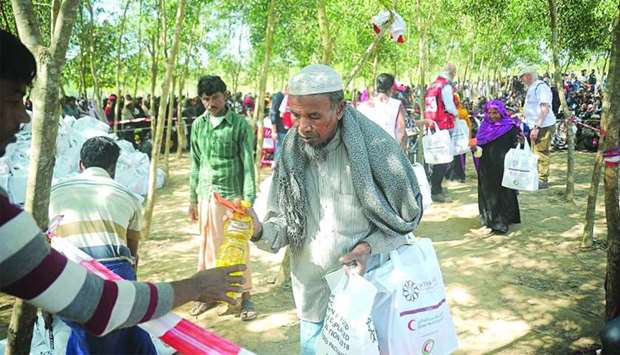Qatar Red Crescent Society (QRCS) has launched an expanded relief intervention for the Rohingya refugees who fled the violence in Myanmar's Rakhine state to Bangladesh.
The $500,000 project is funded by Qatar Fund for Development (QFFD). It is aimed at meeting the urgent needs of refugees in Cox's Bazar city, by covering the sectors of shelter, food and nonfood items, and water and sanitation.
Until the end of January 2018, a total of 18,761 families (112,566 people) had been reached out with food aid, shelter, water, sanitation and hygiene (WASH).
There were two phases of distributing food aid, with the first including 9,600 food packages in Kutubalong, while the second included 1,800 food packages in the Burma Para Camp. Each package contains diverse food staples, such as lentils, sugar, salt, vegetable oil, semolina and high energy biscuits for children. These provisions have been received by 11,400 families (68,400 people).
Initially, 300 shelter kits were delivered in Kutubalong, followed by 872 kits at the Burma Para Camp. Each kit contains tarpaulins, ropes, and wood structures. The makeshift shelters will accommodate 1,172 families (7,032 people).
In the WASH sector, 3,300 hygiene kits were handed over in Minorgona, 1,789 dignity kits were handed over at the Burma Para Camp, and 20 latrines were set up in Kutubalong. Altogether, these activities benefited 5,189 families (31,134 people).
Prior to the distributions, a field needs assessment was conducted at the Burma Para Camp. The beneficiaries were selected in cooperation with Bangladesh Red Crescent Society and registered with the International Federation of the Red Cross and Red Crescent Societies.
The supplies were procured through a public tender, and 16 Rohingya volunteers trained to help their community in building their shelters, particularly the old people and people with special needs.
In the wake of the crisis, QRCS opened a local office in Cox's Bazar, where more than 655,000 Rohingya people took refuge from the violence in Rakhine. They live mostly in substandard camps with no food, water, health care, or other basic needs. Their suffering was even increased by the monsoon of South Asia.

